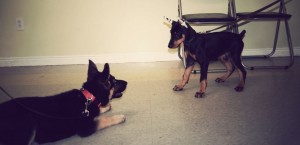Hopefully you are reading this article BEFORE your new puppy arrives! Puppyhood is a very brief period of a dog’s life and getting it right from the start will save you a lot of heartache and headache down the road. Here are our Top 5 Puppy Training Tips to help you out!
Tip 1: Socialization
Puppy socialization is the process of exposing your new puppy to a wide variety of experiences in a safe, comfortable, and positive way. Puppies under the age of 14 weeks are extremely impressionable and early, positive experiences prior to this age can help ensure that your puppy grows up to be confident. The biggest mistake puppy owners make is thinking their dog is “too small” or “too fragile” and should stay at home until they get older. These dogs will never be as confident or relaxed as they could be. Moral of the story – take your puppy with you everywhere!
Tip 2: Disease Prevention
Puppies do not have a fully functional immune system and as such should not be exposed to dogs of unknown vaccination history or other areas of potential contamination. There is a particularly strong strain of Parvovirus that is prevalent in Toronto that will absolutely cripple a young puppy. Until your veterinarian advises, do not take your puppy to places like the dog park! Do attend a Puppy Socialization class, or arrange for play dates with adult dogs whose health background you are aware of.
Tip 3: House Breaking
The easiest and most effective way to house break a dog is through crate training. It is cruel to NOT crate train a dog, since a dog that is crate trained will love their crate and will be comfortable staying there for long periods of time. A dog that loves their crate can go anywhere (air travel, dog shows, dog sport events, hotels, car rides, etc.). A puppy should not have unsupervised access around the house – you are just asking for accidents to happen everywhere and the more they have accidents, the harder it is to house break your new puppy.
Tip 4: Chewing, Biting, and Destructive Behavior
Dogs chew. Puppies chew like crazy as they teethe and this will continue even as the adult teeth come out. Confine your puppy in an X-pen when they are unsupervised so they can’t chew inappropriate items. Make sure your puppy has a wide assortment of chew toys, and help them develop a preference to chew items like marrow bones or kongs by feeding meals out of them. Also, if your puppy is mouthy on you, don’t punish your dog – just put the dog away and give them something else to chew on. Nipping goes away on its own.
Tip 5: Begin Training and Establish House Rules on Day One
With positive reinforcement training, an animal can be trained as soon as it can see and hear. We start training puppies at When Hounds Fly at 8 weeks if possible; some breeders begin clicker training weeks before that. The earlier you start, the better, since early clicker training helps develop a thinking and creative dog early in their life. Similarly, set clear rules for your dog on day one. It is easier to relax them later, than take away privileges later. For example, if you know your Great Dane shouldn’t be on the bed or couch, don’t let your Great Dane puppy on the bed or couch, ever! Or, if you know it’ll be a problem if your soon-to-be 100 lb Newfoundland jumps on grandma, don’t greet and cuddle a jumping 20 lb Newfoundland puppy! Also, a puppy that is frequently left home alone for short amounts of time is far less likely to develop separation anxiety later in life.
We encourage all new puppy owners to enroll in our Puppy Socialization class! While we take puppies up to 16 weeks of age, we would encourage anyone getting a new puppy to start sooner and not delay.

